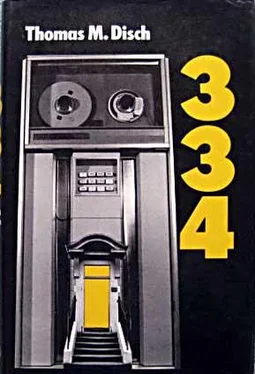White nodded vaguely. He seemed to go away and return. “Well then, take a look yourself.” He handed Ab an old-fashioned brass key. There was a plastic Yin and Yang symbol on the keychain. He pointed to a four-tier metal file on the far side of the office. “Through there.”
The file wouldn’t roll aside from the doorway until, having thought about it, Ab bent down and found the release for the wheels. There was no knob on the door, just a tarnished disc of lock with a word “Chicago” on it. The key fit loosely and the locks had to be coaxed.
The body was scattered all over the patchy linoleum. A heavy rose-like scent masked the stench of the decaying organs. No, it was not something you could have passed off as the result of surgery, and in any case the head seemed to be missing.
He’d wasted an hour to see this.
White stood in the doorway, ignoring, in sympathy to Ab’s feelings, the existence of the dismembered and disemboweled corpse. “He was waiting here, you see, when I went to the hospital. An out-of-towner, and one of my very … I always let them take away whatever they want. Sorry.”
As White was locking up the room again, Ab recollected the one thing he would need irrespective of the body. He hoped it hadn’t gone off with the head.
They found her left arm in the coffin of simulated pine with the Identi-Band still on it. He tried to persuade himself that as long as he had this name there was still half a chance that he’d find something to hang it on.
White sensed Ab’s renascent optimism, and, without sharing it, encouraged him: “Things could be worse.”
Ab frowned. His hope was still too fragile to bear expression.
But White began to float away in his own mild breeze. “Say, Ab, have you ever studied Yoga?”
Ab laughed. “Shit no.”
“You should. You’d be amazed what it can do for you. I don’t stick with it like I should, it’s my own fault, I suppose, but it puts you in touch with… Well, it’s hard to explain.”
White discovered that he was alone in the office. “Where are you going?” he asked.
420 East 65th came into the world as a “luxury” coop, but like most such it had been subdivided by the turn of the century into a number of little hotels, two or three to a floor. These hotels rented rooms or portions of rooms on a weekly basis to singles who either preferred hotel life or who, as aliens, didn’t qualify for a MODICUM dorm. Chapel shared his room at the Colton (named after the actress reputed to have owned the entire twelve rooms of the hotel in the ’80’s and ’90’s) with another ex-convict, but since Lucey left for his job at a retrieval center early in the morning and spent his afterhours cruising for free meat around the piers the two men rarely encountered each other, which was how they liked it. It wasn’t cheap, but where else could they have found accommodations so reassuringly like those they’d known at Sing-Sing: so small, so spare, so dark?
The room had a false floor in the reductionist style of the ’90’s. Lucey never went out without first scrupulously tucking everything away and rolling the floor into place. When Chapel got home from the hospital he would be greeted by a splendid absence: the walls, one window covered by a paper screen, the ceiling with its single recessed light, the waxed wood of the floor. the single decoration was a strip of molding tacked to the walls at what was now, due to the raised floor, eye-level.
He was home, and here, beside the door, bolted to the wall, quietly, wonderfully waiting for him, was his twenty-eight-inch Yamaha of America, none better at any price, nor any cheaper. (Chapel paid all the rental and cable charges himself, since Lucey didn’t like TV)
Chapel did not watch just anything. He saved himself for the programs he felt really strongly about. As the first of these did not come on till 10:30, he spent the intervening hour or two dusting, sanding, waxing, polishing, and generally being good to the floor, just as for nineteen years he had scoured the concrete of his cell every morning and evening. He worked with the mindless and blessed dutifulness of a priest reading his office. Afterwards, calmed, he would roll back the gleaming floorboards from his bed and lie back with conscious worthiness, ready to receive. His body seemed to disappear. Once the box was on, Chapel became another person. At 10:30 he became Eric Laver, the idealistic young lawyer, with his idealistic young notions of right and wrong, which no amount of painful experience, including two disastrous marriages (and the possibility now of a third) ever seemed to dispel. Though lately, since he’d taken on the Forrest case … This was The Whole Truth.
At 11:30 Chapel would have his bowel movement during an intermission of news, sports, and weather.
Then: As The World Turns, which, being more epic in scope, offered its audience different identities on different days. Today, as Bill Harper, Chapel was worried about Moira, his fourteen-year-old problem stepdaughter, who only last Wednesday during a stormy encounter at breakfast had announced to him that she was a lesbian. As if this wasn’t enough, his wife, when he told her what Moira had told him, insisted that many years ago she had loved another woman. Who that other woman might have been he feared he already knew.
It was not the stories that engaged him so, it was the faces of the actors, their voices, their gestures, the smooth, wide-open, whole-bodied way they moved. So long as they themselves seemed stirred by their imaginary problems, Chapel was satisfied. What he needed was the spectacle of authentic emotion—eyes that cried, chests that heaved, lips that kissed or frowned or tightened with anxiety, voices tremulous with concern.
He would sit on the mattress, propped on cushions, four feet back from the screen, breathing quick, shallow breaths, wholly given over to the flickerings and noises of the machine, which were, more than any of his own actions, his life, the central fact of his consciousness, the single source of any happiness Chapel knew or could remember.
A TV had taught Chapel to read. It had taught him to laugh. It had instructed the very muscles of his face how to express pain, fear, anger, and joy. From it he had learned the words to use in all the confusing circumstances of his other, external life. And though he never read, or laughed, or frowned, or spoke, or walked, or did anything as well as his avatars on the screen, yet they’d seen him through well enough, after all, or he would not have been here now, renewing himself at the source.
What he sought here, and what he found, was much more than art. Which he had sampled during prime evening hours and for which he had little use. It was the experience of returning, after the exertions of the day, to a face he could recognize and love, his own or someone else’s. Or if not love, then some feeling as strong. To know, with certainty, that he would feel these same feelings tomorrow, and the next day. In other ages religion had performed this service, telling people the story of their lives, and after a certain lapse of time telling it to them again.
Once a show that Chapel followed on CBS had pulled down such disastrous ratings for six months running that it had been canceled. A pagan forcibly converted to a new religion would have felt the same loss and longing (until the new god has been taught to inhabit the forms abandoned by the god who died) that Chapel felt then, looking at the strange faces inhabiting the screen of his Yamaha for an hour every afternoon. It was as though he’d looked into a mirror and failed to find his reflection. For the first month the pain in his shoulder had become so magnificently more awful that he had almost been unable to do his work at Bellevue. Then, slowly, in the person of young Dr. Landry, he began to rediscover the elements of his own identity.
Читать дальше












